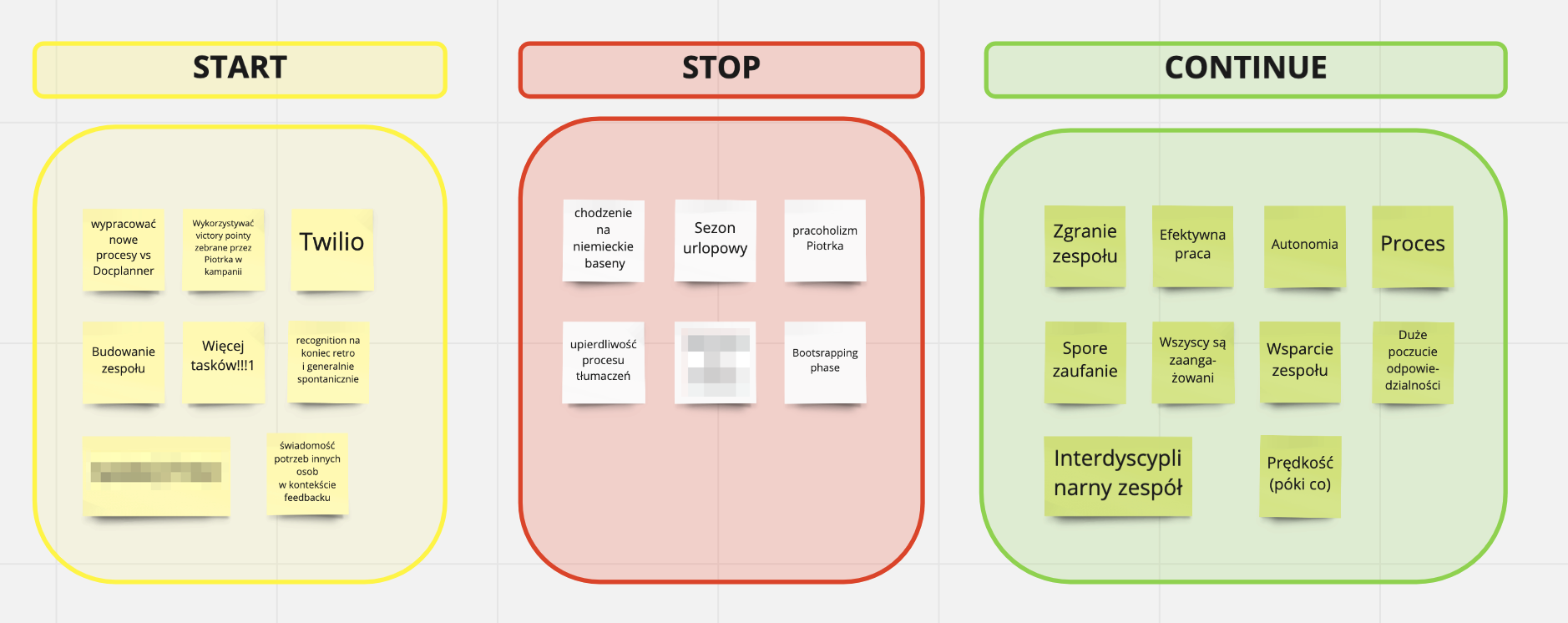Recently Ola (the team’s HRBP) mentioned our Officevibe results to me. She was concerned about some of the categories. A glance at them confirmed that — in comparison to the rest of DP Tech — we ranked higher only in wellness and participation ;) and there were a lot of below-average scores.
We decided to do something about it, but we had different ideas: whether to focus on the officevibe results primarily or to take a step back and let the team figure out what’s bothering them.
What kind of team are we?
First and foremost, we are a small team working on a project in a bootstrapping phase. The core team is fewer than 10 people. We all know each other and work together daily. At this scale, there are no communication issues yet. We can talk about any problem in an all-hands face to face meeting.
On the other hand, it’s too early to tell how will we scale and what will become of us. Today we’re just a bunch of people with a set of skills and a common goal. It’s hard to describe our culture and values, as we didn’t have a chance to form them yet — we just adopted them from Docplanner Tech, treating it as a great foundation we can build upon.
Using tools
Given our current state, I don’t find tools such as Officevibe particularly useful. And it’s not like I’m resenting a new tool someone wants me to adapt: I introduced Officevibe to my team of about 25-30 engineers at my previous job, and it has proven to be useful.
As it turns out, because of how our organization is structured, the officevibe group is fewer than five people. This means that even the slightest hiccup, misinterpreted question, or a bad day can significantly skew the results. And it doesn’t reflect the whole team’s point of view.
My first reaction to those reports was: does this accurately reflect reality? How can we act on this? What are the specifics that bother people? And most importantly: how can we tackle this and improve? Should we approach this anonymously and think about the team as a whole, introducing processes that would over time help to get better scores? Or maybe we can take a more direct approach and just ask people about their opinion?
This is what we did in the end: gathered together to talk about what’s great and what bothers us. The meeting had an open format, but I and Ola facilitated it towards those officevibe categories if no other topics were to be mentioned by the team.
What we found out
In short, there are many good things we all agree with, and there was some constructive feedback and ways to improve. We also got to know each other a little better (and as you can see, we had a lot of fun in the process):

- We all like working together, being effective, and focused on a common goal. We don’t build walls around different departments, but rather use our different skills to improve the product.
- We are also autonomous and responsible — not only for our tasks but for the success of the product as a whole. None of us can succeed unless all of us do.
- We need to start laying out the foundation of the team we want to become in the future. As we grow, we expect to benefit from the small decisions and good principles established today, and we need not miss the best moment to start.
- And we have a long way ahead of us to find our identity and to build an effective workflow between us and the rest of Docplanner Tech, as we operate differently than them and their modus operandi may not be most suitable for our coop.
Most importantly we discovered that the team us ran by Stalter & Waldorf in disguise. Myself and Piotr (the product owner) are most senior team members and also just the right mix of cynical, goal-oriented and pragmatic to cast aside some of the fancy ideas our peers find appealing.
First impressions
Sometime after the meeting, after the dust settled, we talked with Ola about our impressions. And the most intriguing point was:
How can we justify the officevibe results with what we heard from the people — everyone was satisfied and didn’t mention that anything bothered them
It’s a pickle. I think there’s a long road ahead of us to find the courage to be transparent and self-aware enough for those meetings to be even more substantial. Before that happens, we need to pick up the most sublte cues:
- If someone hesitates when stating their opinion, they may be holding back
- People may want to be polite and not to complain about things others find efficient
- Our role as leaders is to focus on even the slightly unfavorable comments — as they may be the tip of an iceberg, or in time grow to become a serious problem if unattended
My gut feeling was that no serious issue would surface during this retrospective. And it didn’t, so we had a chance to see a different view from what officevibe has shown us. At the same time, we learned a bit about how to self-organize, talk honestly to each other, and tested out a new tool that we’ll be using in the future.
Moving forward
Besides all of the points mentioned before, we all agreed that the best path to move forward is to focus on direct, continuous feedback on a daily basis, as well as tightening our relation. A new project manager is joining us in September, so we’re going to find some covid-safe way of meeting in person for a beer or something. Or well just stick to zoom, we’ll see how it pans out.


